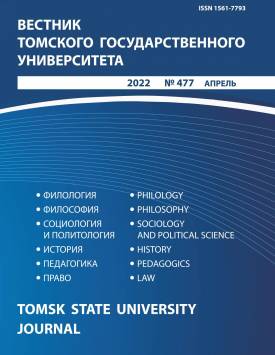Cognitive features of synonymy in German-language legal texts at different stages of development of legal terminology in the system of law
The article presents the results of studying the corpus of German legislation, as well as EU normative legal acts, views on the nature of the legal language, features of studying terminology. The author studies the phenomenon of synonymy in the legal terminology system, the cognitive foundations of this phenomenon at different stages of the developing of legal terminology. The aim of this study is to confirm the existence of the phenomenon of synonymy in the language of law, to establish the reasons for this phenomenon, and to explain the choice of a particular term from the range of possible ones in a reasoned manner. Synonymy is considered as a product of linguistic development, and synonymous terms can distinguish different sides of the same concept, consist in generic relations, clarify the meaning of the dominant term, and also be opposed to each other. The research is based on the comparison and analysis of lexicographic data of dictionaries of general and special vocabulary. The author uses the texts of the legislation of Germany, Austria, and the EU as the research material. National law is considered as a historically formed expression of cultural identity, realized in lexical units designated as “national-cognitive synonyms” (the term of L. A. Chernysheva). At the same time, it is important to take into account the modern processes of convergence of national legislations aimed at unifying legal systems within a single global space, and similar processes that occurred in earlier periods of the development of the language of law. The research methodology is demonstrated on the material of lexemes representing the concept of PERMISSION. As a result of the analysis, the conceptual features of the concept, its nuclear components, as well as features located on the periphery and actualized under certain conditions are established. The author considers several examples of synonymous series, the lexemes of which are in generic relations, adjacency relations or are opposed to each other in order to concretize the concept. Consideration of individual concepts from the perspective of synchrony and diachrony helps to study their structure more deeply, to identify the main and secondary features fixed in the internal form of the word. Contextual analysis allows describing the conditions and reasons for the actualization of conceptual features.
Keywords
German legal terminology, concept, synonymy, national-cognitive synonymsAuthors
| Name | Organization | |
| Berezovskaya Anstassia V. | MGIMO University, Ministry of Foreign Affairs; Permanent Mission of the Russian Federation to International Organizations in Vienna | frau.berezovskaya@yandex.ru |
References

Cognitive features of synonymy in German-language legal texts at different stages of development of legal terminology in the system of law | Vestnik Tomskogo gosudarstvennogo universiteta – Tomsk State University Journal. 2022. № 477. DOI: 10.17223/15617793/477/1
